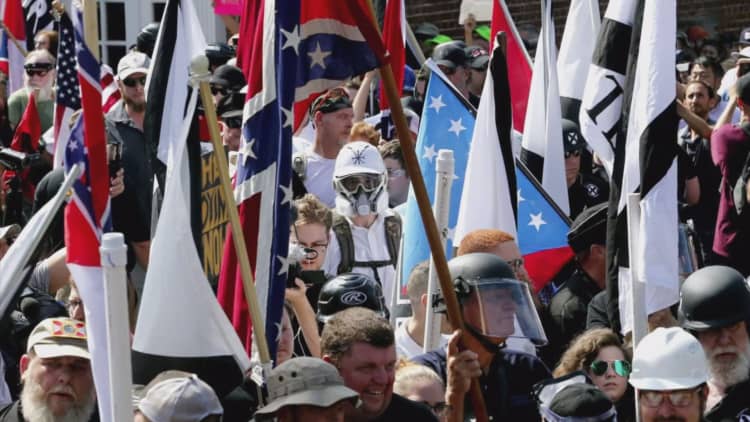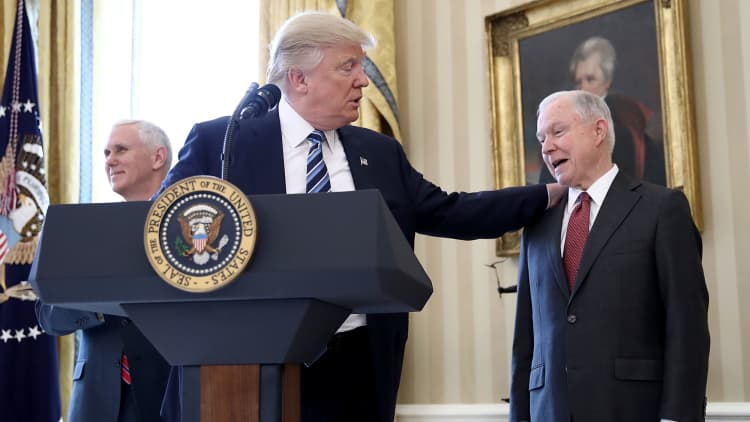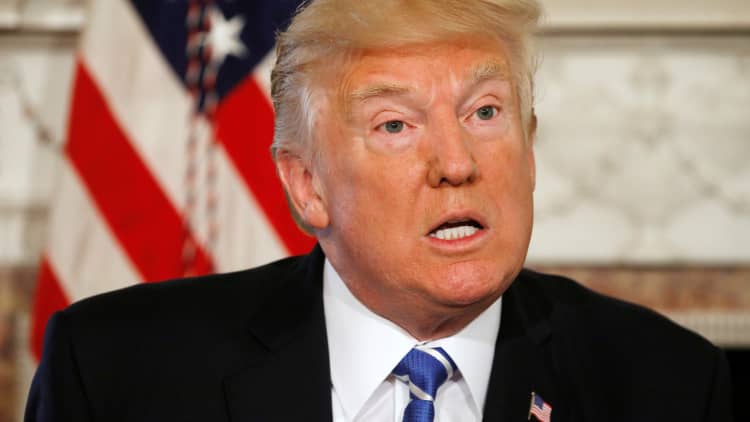
Ninety years ago, President Donald Trump's father was arrested at a Ku Klux Klan march in New York City.
Forty-four years ago, the Trump family's real estate company was accused by a Republican-run U.S. Justice Department of discriminating against blacks. The company settled.
Twenty-eight years ago, Trump publicly called for capital punishment after five black youths were charged with a crime of which they were later cleared. "Maybe hate is what we need if we're going to get something done," he told a television interviewer.
Six years ago, Trump sought to discredit the legitimacy of America's first black president. He spread the fabricated suggestion that President Barack Obama was born abroad and not, in fact, American.
Two years ago, Trump opened his own campaign for the White House by denouncing Mexican immigrants. "They're bringing drugs, they're bringing crime, they're rapists," he said.
Last year, Trump equivocated about the endorsement of a former KKK leader, saying "I know nothing about David Duke" or white supremacists. He said a federal judge couldn't fairly oversee claims against him because "he's Mexican." He selected a champion of the "alt-right" — a term for white nationalist extremists — as his campaign's chief executive.
'Least racist person ... you've ever seen'
Americans can draw their own conclusions about whether those represent discrete events, to be considered individually, or a pattern of beliefs and behavior. Trump calls himself "the least racist person ... the least anti-Semitic person that you've ever seen in your entire life."
But in 2016, white Americans with racial and religious grievances heard a signal. A post-election Democracy Fund study identified Trump's most important group of supporters as voters with a strong sense of identity as white Christians and negative feelings toward immigration, blacks and Muslims.
With words and actions, Trump has gratified them as president. He made Stephen Bannon, who called the Breitbart news site he ran a "platform for the alt-right," his chief White House strategist. He has sought to ban travel to the U.S. by residents of certain majority-Muslim countries, to toughen apprehension of illegal immigrants and to reduce legal immigration.
His attorney general, Jeff Sessions — once rejected for a federal judgeship by a Republican-controlled Senate over accusations of racial insensitivity — has halted federal efforts to adjust local law enforcement practices in response to complaints of excessive force against minorities. The president himself, in a speech featuring lurid descriptions of violence by immigrant gang members, suggested that police deliberately rough up criminal suspects.
None of that made Republican politicians abandon him in large numbers. The president's policies, on issues from health care to tax cuts to business deregulation, have overlapped sufficiently with the goals of mainstream conservatism as to shield him from criticism.

'Disgust for Trump within the Senate'
But the shield has grown thinner. The causes include revelations from multiple investigations involving Trump and Russia, chaos and incompetence in the White House, and public attacks on Republicans including Senate Majority Leader Mitch McConnell.
"The personal disgust for Trump within the Senate is really remarkable," a top GOP strategist told me last week.
Now the president's refusal to condemn the "Unite the Right" gathering in Charlottesville, Virginia, which included the former Klan leader Duke, has begun pulling private disdain into the open.
The more obscure the president's actions, the likelier Republican leaders have been to remain quiet for fear of antagonizing his core supporters. But on Saturday, a Dodge Charger plowed into a group of people who were counter-protesting at that gathering of hundreds of white nationalists. One person died and more than a dozen were injured. The president's response blamed "many sides."
The graphic, deadly events this weekend, and the president's response to them, threaten his party with the broader electorate that grows more diverse and more tolerant with every passing year.
In addressing the attack, Trump cast white supremacists and neo-Nazis carrying torches onto the University of Virginia campus as morally equivalent to counter-protesters advocating racial equality. His stance — a purposeful choice by a president who relishes singling out so many others for criticism — places him at odds with the values of the nation he was elected to serve.
That raises risks for elected officials who stand with Trump at a moment of legal, as well as political, jeopardy. It further complicates prospects for the Republican agenda on tax cuts, health care and other issues. It increases the possibility that Trump's presidency itself will be cut short.
Watch: Trump's comments on Charlottesville attack did not go far enough: National Urban League's Marc Morial



